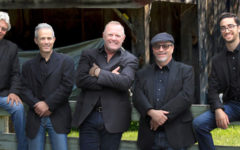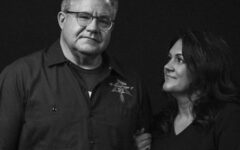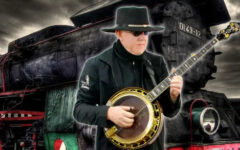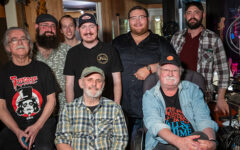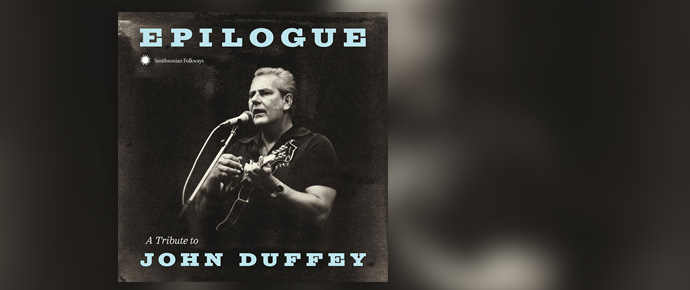
Well over 20 years after John Duffey’s passing in December 1996 he continues to be revered. And thanks to Sugar Hill Records (in 2000) with Always in Style: A Classic Collection and Rebel Records (in 2011) with Rebel Years: 1962-1977 by John Duffey existing fans and newer followers – prompted by the release of those two CDs – have been able to enjoy Duffey’s unique voice and stellar mandolin artistry.
One of Duffey’s most ardent advocates is Akira Otsuka, who, for the past 15 years, has been working on another John Duffey tribute album. Now, as we have entered June we are closer to the day when Otsuka will be able to show us the fruits of his labors.
Bluegrass Today spoke to him to learn more about this already highly-praised homage to a much-loved bluegrass music icon, Epilogue: Tribute to John Duffey.
When did you have the idea for the John Duffey tribute album, please? What prompted you to do it?
“It was not my idea. Even though I agreed right away, it was my co-producer/engineer and close friend, Ronnie Freeland’s, idea. In the fall of 2002, on the way back from IBMA, Ronnie asked me if we should do this, and I said yes. How he came up with the idea, I don’t know but both of us were very close to Duffey for many years and we really missed him.
How did the project develop (did the artists engaged choose the songs that they recorded, or did you already have specific songs in mind?)?
“Musicians didn’t have any choice. Ronnie and I picked all the players and singers. Some songs we knew who we wanted – for example we had planned Fred Travers to sing Reason for Being, and James King to sing Going to the Races. Some songs we just recorded the tracks without knowing who would sing them. Same as the instrumentation – some songs we knew who we wanted and some we didn’t. For example, we wanted Bill Emerson on If I Were a Carpenter because Duffey made a guest appearance on Emerson & Waldron’s version while Duffey was still retired from music. A few years later Duffey sang lead and recorded it with the Scene on their Live at Cellar Door album.
In a way Ronnie and I were playing a fantasy bluegrass team – let’s get singer A because he or she would sound great on this song, and then have singer B to sing tenor to that. Never heard them singing together before, but I bet they’d sound great, and so on. Dreaming up a great team for each song and making it happen was one of the fun parts.”
The first session was on New Year’s Eve 2002 with Tony Rice (guitar), Ronnie Simpkins (bass) and Otsuka (playing John Duffey’s Gibson F-12 mandolin), at Ronnie Freeland’s studio, where they recorded He Was a Friend of Mine. It was a bit traumatic for you personally?
“I had been on stage with Tony before but, recording with just three of us was, maybe not traumatic, but say nerve-racking. I can hear nervousness in my mandolin part, so we were going to over-dub my break, but Ronnie passed away before we got to it. So, you’re hearing my original take.”
Then you did some basic tracks with Chris Stifel on guitar, Johnny Castle on bass and Tim Mitchell on banjo; were you playing mandolin on these tracks?
“Yes, I recorded mandolin on these tracks, but I knew most of them would be replaced by other mandolin players like David Grisman, Wayne Benson, Adam Steffey, etc… – and that was our plan from the beginning. If a guitar player came in before Wayne Benson came to record mandolin, then a guitar player was hearing my mandolin track.”
Did you play mandolin on all the tracks?
“…. except on Chim-Chim-Cher-Ee, which does not have mandolin (Duffey played guitar on the original recording), and Bringing Mary Home, which was a live cut and Lou [Reid] was playing mandolin.”
In the finished versions Otsuka’s mandolin playing can be heard on the recordings of Sad and Lonesome Day; He Was a Friend of Mine; Reason For Being; and First Tear; this last one being a track from his excellent solo CD of the same name (Patuxent Music).
While on the subject of mandolins, Otsuka volunteered, “I would also like to point out Marc MacGlashan, Wayne Benson, David Grisman and Lou Reid (on Christmas Time Back Home) used Duffey’s F12 mandolin.”
After that, the recording of some songs was carried out under unusual circumstances. Tell me about that process, please.
“Ronnie Freeland and I took recording equipment to IBMA’s World of Bluegrass in Louisville, Kentucky, in 2003 and recorded in a hotel room. Recording in a hotel room is nothing new – I believe even Bill Monroe had done that. Instead of inviting musicians to Ronnie’s studio, we went to where the musicians were.”
How did the sessions progress from there and over what time period were they done?
“We recorded many artists in Louisville, but after that we recorded one artist at a time mostly. We’d look at artist websites and checked the calendars for local venues (Birchmere, for example) to see if any artist we wanted to use would come through town. Or, I would get in touch with some artists and asked them to come to the studio – especially local people like Bill Emerson, Ben Eldridge, Jimmy Gaudreau, Fred Travers…
The bulk of recording was done in 2003 and 2004 and some fixes were done in 2005.”
Ronnie Freeland passed away in July 2014. What effect did this have on your efforts to get this album completed and released?
“Ronnie was sick on and off more than 10 years before he passed away, and that’s one of the reasons this project took so long to finish. After he passed away, one of the biggest challenges I faced, was Christmas Time Back Home. Because we used so many people on that song, Ronnie left it till the very end, and he died before he could finish it. It was a huge task for me and took me a long time to digitize and edit it. Then my friend, Rick Watson, mixed it and he did a wonderful job.”
A total of 53 musicians – many of them having worked with John Duffey during his career with the Country Gentlemen and Seldom Scene – were used to record this tribute to John Duffey.
They are Eddie and Martha Adcock; Mike Auldridge; Alan Bartram; Wayne Benson; Ronnie Bowman; Sam Bush; Dudley Connell; John Cowan; Jerry Douglas; Jonathan Edwards; Ben Eldridge; Bill Emerson; Shelton Feazell; Bela Fleck; Jimmy Gaudreau; Tom Gray; David Grier; David Grisman; Steve Gulley; Ron Inscore; James King; Tim Kruzic; Jack Lawrence; Nils Lofgren; Marc MacGlashan; Bruce Molsky; Jason Moore; Tim O’Brien; Akira Otsuka; David Parmley; Todd Phillips; Lou Reid; Tony Rice; Wyatt Rice; Don Rigsby; Beth and Phil Rosenthal; Mark Schatz; Sammy Shelor; Rickie Simpkins; Ronnie Simpkins; Amanda and Kenny Smith; John Starling; Adam Steffey; Ron Stewart; Chris Stifel; Ron Thomason; Fred Travers; Randy Waller; Rick Watson; and Dede Wyland.
As well as having recording sessions in Kentucky and Maryland, where Freeland’s studio was located, they cut some tracks at studios in Tennessee and Connecticut.
The 45-page booklet of liner notes and some rarely seen photographs can be accessed and download at Folkways website.
Epilogue: Tribute to John Duffey (Smithsonian/Folkways SFW CD 40228) will be released on June 22, 2018.
The track listing is as follows ….
Sad and Lonesome Day; If That’s the Way You Feel; If I Were a Carpenter; Lonesome River; Sunrise; Going to the Races; Some Old Day; Girl from the North Country; He Was a Friend of Mine; Poor Ellen Smith; Reason For Being; Ain’t Gonna Work Tomorrow; Chim-Chim-Cher-Ee; Cold Wind a Blowin’; Christmas Time Back Home; Bringing Mary Home; and First Tear.
I can’t wait for the day that I can listen to this CD.
Additional songs samples are available online.
Footnote:
Ronnie Freeland’s father, Dick, founded Rebel Records.

